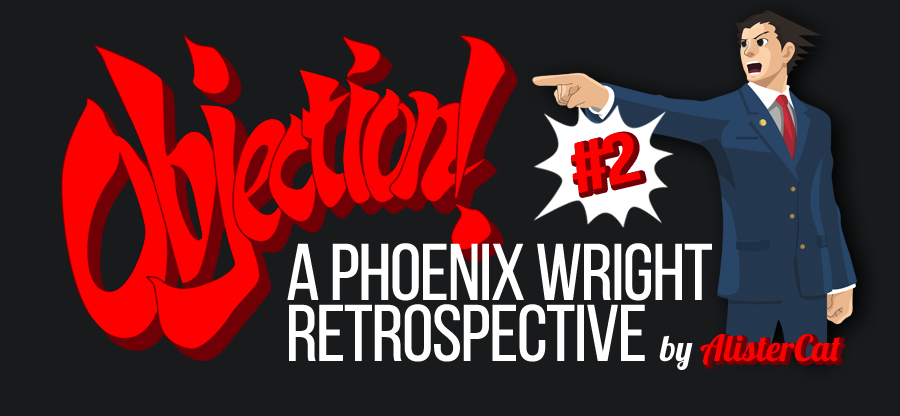
Welcome back! It's been a while since I wrote the original entry to this series as I wasn't sure whether I wanted to continue it. My intention was to expose new people to this wonderful, crazy series but it seemed to only reach people already very familiar with the games. Today I hope to (without spoilers) walk you through the first game in the series, Phoenix Wright Ace Attorney. After that I will reconsider, but for now let's take a look at the game that laid down the gameplay systems and style that make this series so beloved (albeit by a niche audience).
Many consider the first in the series to be the best (though this is true of a lot of games, even movies etc.). While I disagree with this opinion, I think that a lot of what determines a players favourite comes down to the individual cases/scenarios in each game since the foundations remain the same. Much like Walking Dead, Phoenix Wright could well have been just one title with a long line of episodic DLC. A missed opportunity in my mind, but that is another topic all together.
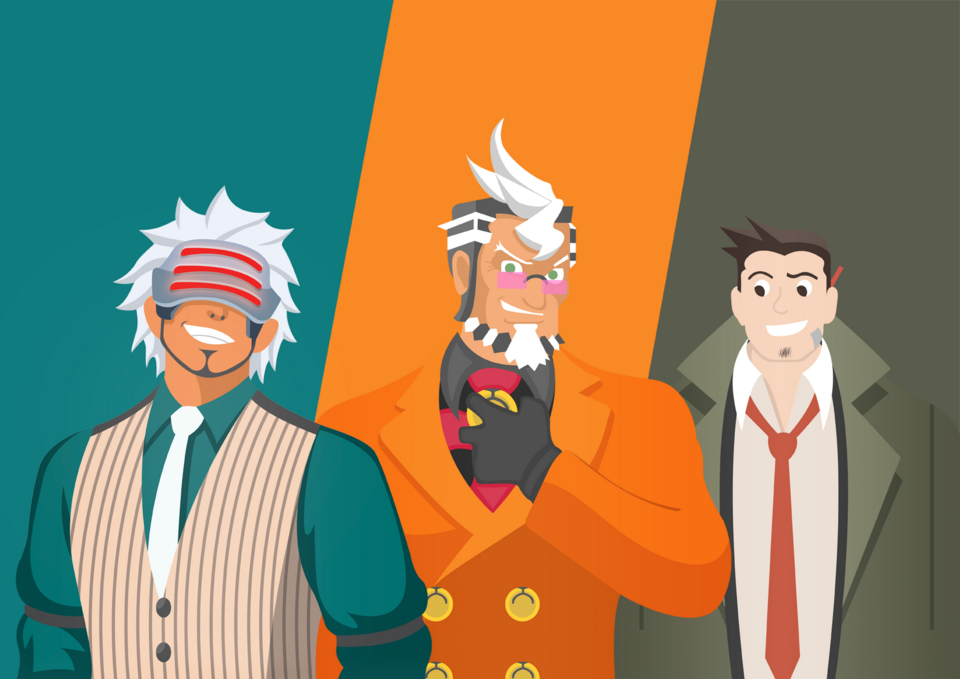
I AM THE LAW!
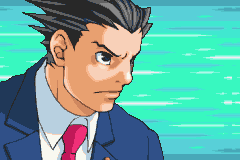
The most important concepts to understand with Phoenix Wright are those of its legal system, and the logical rules it follows. I touched on this in the previous blog, but the legal system in this game is a complicated affair. Partially a representation of the Japanese legal system, partially a criticism of the Japanese legal system, partially a corruption of how the law is viewed in both the east and west (because localisation confusing the setting) but I think most importantly a 'shocking' design decision: whatever is convenient for the gameplay or story they wanted to tell.
One of the biggest hurdles for new players is the dissonance between a personal sense of justice, how the law is applied, and the differing legal systems from around the world. Without being a lawyer I don't think it is possible for the player to resolve a lot of how the law is exercised in these games because it is such a complicated matching of motivations. Anecdotally this has caused a lot of frustration for people I have introduced these games to and I don't really have a good answer to criticisms levelled against it. I am not well versed in even the legal system of my own country let alone Japan or America but I shouldn't have to be. It lead me to a realisation that the legal system does not work how I thought, no matter where you may live. Though taking legal advice from a game is a bad idea anyway. Seriously, don't do it.
This is not Lawyer Simulator 2014.
For the most part the logic laid out in this game applies to all of the titles, so let's take a look at the fundamentals.
- Trials only last up to 3 days!
This is laid out very quickly, and brushed off with the explanation that there is so much crime that they need to resolve these trials quickly. This is an example of design decisions that are gameplay convenient. They need a reason to make the cases snappy and urgent, rather than the reality of trials which are long, drawn out affairs that are ALL about procedure. - Trials commence the day following the crime!
This is one of my least favourite things about the game. Again, this is to make the process much quicker than it really is. Most of the time the investigation has not even been completed by the first day of the trial, autopsy reports are incomplete and inaccurate. Give the police time to do their job! The only way they find a suspect for a next day trial is because of incomplete evidence and jumping to conclusions. - Prosecutors run crime scenes and are in charge of the police
Lawyer's relationship with law enforcement most likely differs around the world, but I'm pretty sure that anyone would find it highly suspect and contemptible to keep defence from examining evidence but allow the prosecution control over how the police operate without the slightest concern for corruption or evidence tampering. Speaking of which... - See some evidence? Just put it in your pocket!
The way you gather evidence is literally just picking it up off the ground. No concern for contaminating the crime scene, putting your fingerprints on anything, or just removing evidence from the scene and not presenting it. In court any evidence you present is taken on faith alone! There is actually one case in the first game that lightly touches on the issue of evidence law and the process of police approval etc but this is the DS exclusive case written after the original 3 games and is not brought up ever again. - There is a judge, no jury. Decisive evidence is all that matters.
A lot of legal systems use a jury to render judgement. Both sides present their arguments based on available witnesses and evidence. Here you have a system where the judge's word is all that matters, and all that matters is decisive evidence or testimony. No matter how much you prove, without direct evidence it isn't enough for a conviction. To the series credit, this is constantly criticised (most seriously in Apollo Justice) due to several instances where you run up against the limits of the law and have to find creative ways around it. - Witness testimony is all the prosecution needs. Lying? Who cares!
In place of evidence, the prosecution will often call upon eye witness testimony. The credibility of a witness is rarely brought in to question and their statements must be shown to be contradictory in order to question the validity of the testimony otherwise that's it. The judge is satisfied with it as the truth. No concern for conflict of interest or lying. Perjury is rarely even brought up.
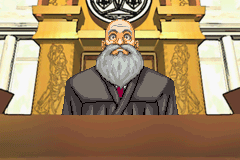
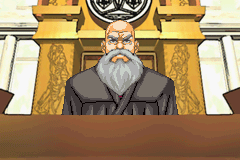
Crazy, right? Each person reading this will find one or two, if not all of the above points objectionable (hehe). I really wish I had the education to provide a more profound analysis of the law but these are the most gameplay relevant points that affect how you think. After all, you'll need to keep these things in mind while solving the logic puzzles that make up most of the game.
Cases
The game opens with Phoenix's first time in court as a newly joined partner at the Fey & Co. law offices. With his boss Mia Fey supporting him, Phoenix takes on his first client; a long time friend Larry Butz. He's a completely useless, annoying guy that you better like as he is a recurring character in many of the other games. You'll have to contend with his profound stupidity in court as he manages to incriminate himself making your work much more difficult.
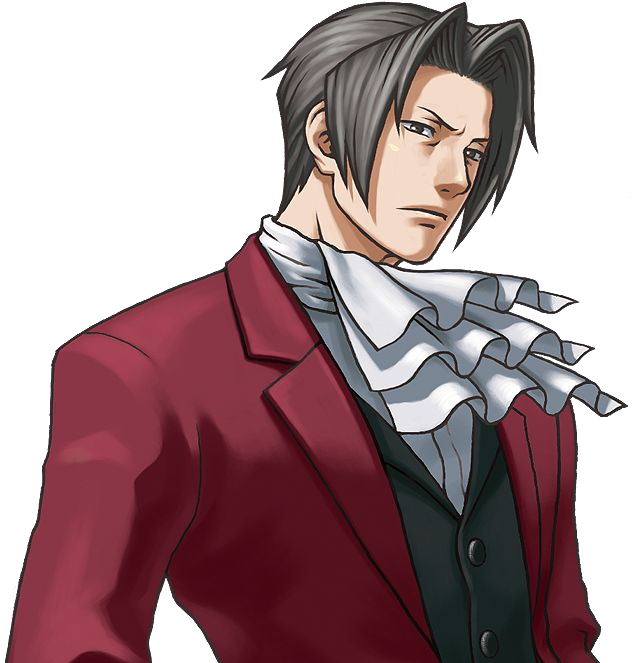
The first case introduces other long time characters such as The Judge, and Winston Payne who serves as the tutorial case prosecutor. Weak and unskilled. A perfect opponent for the tutorial. What, you think you'll face THE Miles Edgeworth from the get go? You've got to feel the Payne first. The case is fairly obvious, and is light on punishments while you adjust to how the game works. After your first victory you'll be launched in to the game proper, as the tutorial case only includes the court portion of the game. All other cases include an investigation phase where you gather evidence before entering court.
I won't go in to too much detail about all the cases in the game, but the second case introduces some key concepts and themes that are rather important. Case 2 opens with a bang; the murder of your boss Mia Fey! Through a series of events you must defend her sister, Maya Fey, a spirit medium in training. Spirit... medium? Yes, the supernatural is a fact in this world, though not everyone believes. This becomes highly relevant going forward as Maya Fey becomes your assistant, often using her powers to channel her dead sister to help you. Vague reasoning is given to prevent her from being summoned at all times which creates tension as Phoenix amateurishly fumbles his way through cases and just managing to scrape by.
The final case of the original game sees you challenging legendary prosecutor Manfred Von Karma and represents a progression in difficulty of your opponents. The DS version and subsequent ports, however, feature an additional case that introduces some interesting touch screen mechanics that allow you to examine evidence and dust for finger prints. It adds some enjoyable variety, but in the series as a whole feels out of place because it is the only case in this trilogy to feature these new elements.
Art & Music
The game features animated sprites drawn in an anime style but with 8-bit limitations (such as colour depth). I've already discussed my displeasure with the 'HD' remake as I am quite enamoured with the look of the chunky pixels in this game. The animation style could be described as 'low framerate' and often looping which can be quite jarring at first but becomes a clear stylistic choice that gets under your skin and creates a smile every time you see Phoenix slam his desk or point to yell "OBJECTION!".
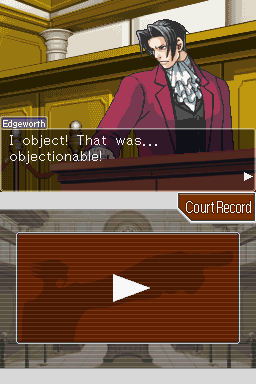
The music follows the 8-bit theme with some chiptune style music, and there's a good chance that if you've heard someone talk about phoenix wright you've also heard that the music is fantastic. You see, these games have so little to work with in terms of world building. You have 2D sprite graphics with a limited colour depth, compressed sound effects and music tracks. Yet these elements are well designed and end up creating an atmosphere, a nebulous feeling that I struggle to describe. Adding a high tempo chiptune track and the sound of explosions to penalties goes a long way to turning the tedium of law in to something exciting and dynamic. You might see now why I really value the look and sound of this game as it is specifically engineered and not remaining faithful to that has diminished the impact of the HD re-release.
In terms of music, listen for yourself. This is a selection of my favourite pieces from the soundtrack to the first game.
Hey. You. if you liked this blog, let me know. I want to hear from people not already familiar with the series. Did I do a poor job? Is this boring? Is my writing bad? I need feedback.
Log in to comment